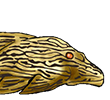Leopardfrogplec wrote:- Olivia - Please do not say they need 5 Zebra plecs as company

how much money is an 11yearold expected to have? (Answer; £336.78 to start with, if you have to know.)
They don't need 5 zebra plecs as company... They need 10! Nah I'm just kidding.
The article Shane posted is a great guide and should tell you basically all you need to know. Although I don't keep P. compta, it would feel quite at home with my Hypancistrus. The only things they need are places to hide in that they can squeeze into (I use clay caves as well as driftwood with holes in it) as well as a good level of current. I go for about 10x the tank volume per hour (ie. 90 L would need 900 L per hour turnover).
Larry (apistomaster) brings up a very good point about acclimatising wild caught specimens. A common issue among loricariids that are newly bought is that they do not feed. Frozen bloodworms are an excellent food to help get some of the pickier loricariids eating in your aquarium.
Is this your first fish tank? I ask because I still remember when I was 11 and starting my first fish tank (at least, the first one that wasn't my parents'). I was pretty ambitious at the time but my experience and knowledge were not always up to the challenge. I would not recommend most ornamental plecs to beginners primarily due to their price and their shy habits (the shy habits won't be a problem in your tank because your just keeping them with glass cats); many beginner bumps can become expensive mistakes when you are keeping something with a P. compta price tag on them. Since you're taking the time to do research I'm sure you're familiar with many basic concepts, but I just want to double-check and make sure that you are aware of things such as the Nitrogen cycle; you do not want to have a newly cycling tank with fish as pricy as P. compta.
[Mod edit: Fix minor typo --Mats ]




